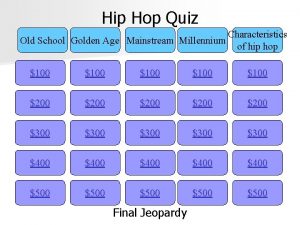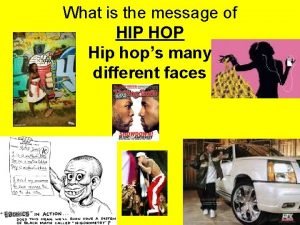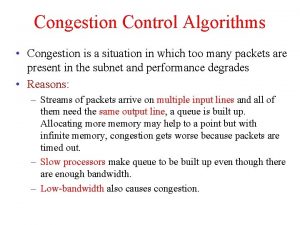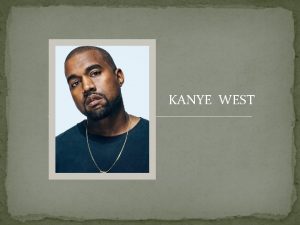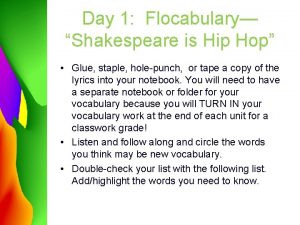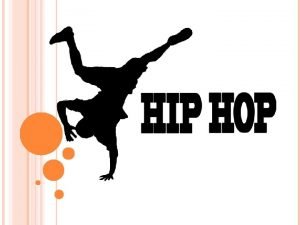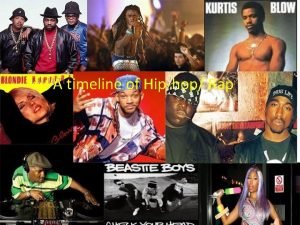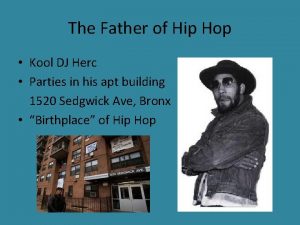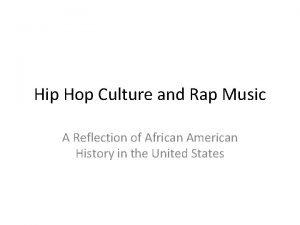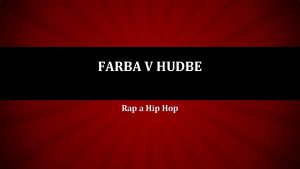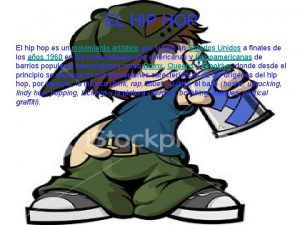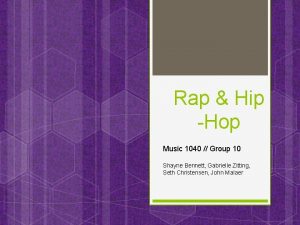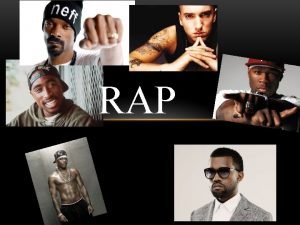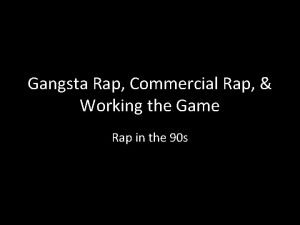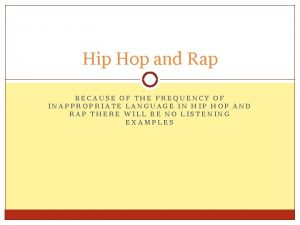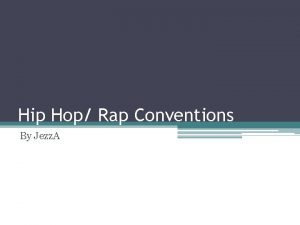Hip Hop Culture and Rap Music A Reflection



















- Slides: 19

Hip Hop Culture and Rap Music { A Reflection of African American History in the United States

Hip Hop: Today's Civil Rights Movement? Musical Culture More Relevant than King Speeches

THE HISTORY OF RAP

The history of rap music has its roots since the days of slavery. This form of music was an outlet originally for the pain and suffering experienced by slaves. Although rap music has been around for centuries, it made a comeback in 1975 in New York. Origin of Rap Music

Rap Music’s Beginning “Rap music emerged out of a Hip-Hop culture of the 1960’s and 1970’s with its emphasis on political expression and resistance through graffiti, modes of dress, language and social practices” (Beach) Grandmaster Flash photo by Stuart Sevastes

Rap music was influenced by Jamaican “toasting” especially by a Jamaican immigrant in 1967 Clive Campbell who became know as DJ Kool Herc” (Rhodes) DJ Kool Herc- The Original

Growing Unrest • • Leon Litwack in his article on the civil rights movement for The Journal of Southern History notes, “it became increasingly difficult towage the kind of campaign [Martin Luther] King preached. New voices—Stokely Carmichael, Malcolm X, the Black Panthers— suggested new moods in black America Malcolm X

“The more black Americans found themselves excluded from the mainstream, the greater the possibilities for violent confrontation with the more visible symbols of white society. Growing Unrest

Civil Rights “Even as the civil rights movement struck down legal barriers…it failed to diminish economic inequalities” (Litwack)

The premiere record with a rap label was Rapper’s Delight by Sugar Hill. Musical elements in this song included: light guitars, high-hat drumming, and hand claps over very deep funk base line. Rapper’s Delight

• • • “The Bronx community-center dances and block parties where hip-hop began in the early 1970’s were not demonstrations for justice, they were celebrations of survival”(Chang) The seeds of later political rap were being sown “Grandmaster Flash and the Furious Five…[created] the classic song “The Message” [which] resonated with an explosive terrifying mix of desperation and anger”(Litwack) Rap and Hip-Hop in the Bronx

Through the mid-1980’s rappers like Run-DMC and Soul Sonic Force “weighed in on topics like racism, nuclear proliferation, and apartheid”(Chang) Run-DMC Finds a much larger audience than early rap (including white “rockers”) Political Rap

A Growing Industry In 1984, the white population was turned on to rap music. The two races were combined in “Walk This Way” by Aerosmith and Run DMC. With the growth of white audiences came the onset of white rap performers.

Since the 1980 s, the artists of this early form of rap music were young black men having white producers. The first lyrics of this new music genre tried to show the ‘blackness’ the artist by using foreign, sexually charged, and criminal underworld against which the norms of white society. A New Wave

The first rap group whose music was not formed on inner city streets, but in the middle class of Long Island. This music was about the unequal treatment of police toward blacks and they believed blacks still did not belong in white America. ‘FIGHT THE POWER’ “Elvis was a hero to most But he never meant shit to me, you see Straight up racist that sucker was simple and plain Mother f**** him and John Wayne Cause I’m black and I’m proud I’m ready and hyped, plus I’m amped Most of my heroes don’t appear on those stamps Sample a look back, you look and find Nothing but rednecks for four hundred years if you check” Public Enemy

• • • Increasing frustration and antagonism a “post-civil rights stance” Led by Public Enemy rappers “displayed the Black Panthers media savvy and the Minister Louis Farrakhan’s nationalist rage”(Chang) In 1988 NWA entered the Top-20 charts with its album Straight Out of Compton which included the song “F—k tha Police”(Litwack) Late 80’s early 90’s

“Street Poets” “African Americans who articulated growing despair at being caged in deteriorating postindustrial cities” (Litwack) Ice T album Body Count which included the single “Cop Killer”

Current State of Rap music • • • Kanye West “One might ask whether rap has abandoned the revolution” “The hip-hop lifestyle is now available for purchase in every suburban mall” Hip-hop rose by making blackness— even radical blackness—the worldwide trading currency of cultural cool”(Chang)

The rap industry is still growing and setting trends all over the world, from clothes to jewelry. Many clothing lines have been started by rap artist such as Rocawear and Sean John. Political issues are also being addressed by some rappers in songs and in the media. For example recently Lil Wayne has a song over Kanye West’s beat for “Damage is Done” where he briefly discusses the event of Hurricane Katrina. Rap’s Future
 Hip hop hip the hippity
Hip hop hip the hippity Hip hop quiz
Hip hop quiz Musikalische merkmale hip hop
Musikalische merkmale hip hop Hip hop hip to the hippity
Hip hop hip to the hippity Hiphop magazine
Hiphop magazine Choke packet in congestion control
Choke packet in congestion control General principles of congestion control
General principles of congestion control Hop by hop choke packet
Hop by hop choke packet Hop by hop choke packet
Hop by hop choke packet Hop to hop
Hop to hop Hop on hop off delhi
Hop on hop off delhi Rap rap artinya
Rap rap artinya Hip hop prezentace
Hip hop prezentace Hip hop for php
Hip hop for php Shakespeare flocabulary answers
Shakespeare flocabulary answers Curiosidades del hip hop
Curiosidades del hip hop Timeline of rap
Timeline of rap Father of hip hop
Father of hip hop Subkultur hip hop
Subkultur hip hop Hip hop presentation
Hip hop presentation

